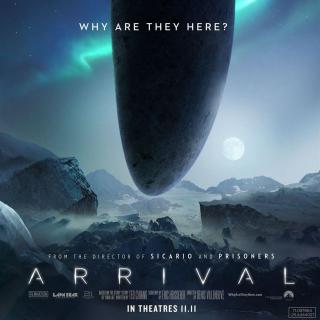
介绍:
And then I got a phone call, a request for a meeting.I spotted them waiting in the hallway, outside my office. They made an odd couple; one wore a military
uniform and a crew cut, and carried an aluminum briefcase. He seemed to be assessing his surroundings
with a critical eye. The other one was easily identifiable as an academic: full beard and mustache, wearing
corduroy. He was browsing through the overlapping sheets stapled to a bulletin board nearby.
“Colonel Weber, I presume?” I shook hands with the soldier. “Louise Banks.”
“Dr. Banks. Thank you for taking the time to speak with us,” he said.
“Not at all; any excuse to avoid the faculty meeting.”
Colonel Weber indicated his companion. “This is Dr. Gary Donnelly, the physicist I mentioned when we
spoke on the phone.”
“Call me Gary,” he said as we shook hands. “I'm anxious to hear what you have to say.”
We entered my office. I moved a couple of stacks of books off the second guest chair, and we all sat
down. “You said you wanted me to listen to a recording. I presume this has something to do with the
aliens?”
“All I can offer is the recording,” said Colonel Weber.
“Okay, let's hear it.”
Colonel Weber took a tape machine out of his briefcase and pressed PLAY. The recording sounded
vaguely like that of a wet dog shaking the water out of its fur.
“What do you make of that?” he asked.
I withheld my comparison to a wet dog. “What was the context in which this recording was made?”
“I'm not at liberty to say.”
“It would help me interpret those sounds. Could you see the alien while it was speaking? Was it doing
anything at the time?”
“The recording is all I can offer.”
“You won't be giving anything away if you tell me that you've seen the aliens; the public's assumed you
have.”
Colonel Weber wasn't budging. “Do you have any opinion about its linguistic properties?” he asked.
“Well, it's clear that their vocal tract is substantially different from a human vocal tract. I assume that these
aliens don't look like humans?”
The colonel was about to say something noncommittal when Gary Donnelly asked, “Can you make any
guesses based on the tape?”
“Not really. It doesn't sound like they're using a larynx to make those sounds, but that doesn't tell me what
they look like.”
“Anything—is there anything else you can tell us?” asked Colonel Weber.
I could see he wasn't accustomed to consulting a civilian. “Only that establishing communications is going
to be really difficult because of the difference in anatomy. They're almost certainly using sounds that thehuman vocal tract can't reproduce, and maybe sounds that the human ear can't distinguish.”
“You mean infra- or ultrasonic frequencies?” asked Gary Donnelly.
“Not specifically. I just mean that the human auditory system isn't an absolute acoustic instrument; It's
optimized to recognize the sounds that a human larynx makes. With an alien vocal system, all bets are
off.” I shrugged. “Maybe we'll be able to hear the difference between alien phonemes, given enough
practice, but it's possible our ears simply can't recognize the distinctions they consider meaningful. In that
case we'd need a sound spectrograph to know what an alien is saying.”
Colonel Weber asked, “Suppose I gave you an hour's worth of recordings; how long would it take you to
determine if we need this sound spectrograph or not?”
“I couldn't determine that with just a recording no matter how much time I had. I'd need to talk with the
aliens directly.”
The colonel shook his head. “Not possible.”
I tried to break it to him gently. “That's your call, of course. But the only way to learn an unknown language
is to interact with a native speaker, and by that I mean asking questions, holding a conversation, that sort
of thing. Without that, it's simply not possible. So if you want to learn the aliens' language, someone with
training in field linguistics—whether it's me or someone else—will have to talk with an alien. Recordings
alone aren't sufficient.”
Colonel Weber frowned. “You seem to be implying that no alien could have learned human languages by
monitoring our broadcasts.”
“I doubt it. They'd need instructional material specifically designed to teach human languages to nonhumans. Either that, or interaction with a human. If they had either of those, they could learn a lot from TV,
but otherwise, they wouldn't have a starting point.”
The colonel clearly found this interesting; evidently his philosophy was, the less the aliens knew, the
better. Gary Donnelly read the colonel's expression too and rolled his eyes. I suppressed a smile.
Then Colonel Weber asked, “Suppose you were learning a new language by talking to its speakers; could
you do it without teaching them English?”
“That would depend on how cooperative the native speakers were. They'd almost certainly pick up bits
and pieces while I'm learning their language, but it wouldn't have to be much if they're willing to teach. On
the other hand, if they'd rather learn English than teach us their language, that would make things far
more difficult.”
The colonel nodded. “I'll get back to you on this matter.”
大家还在听

